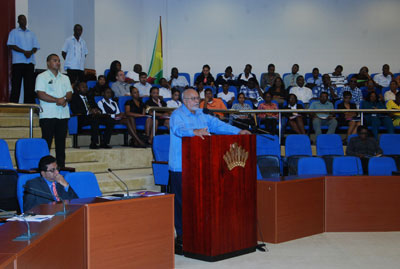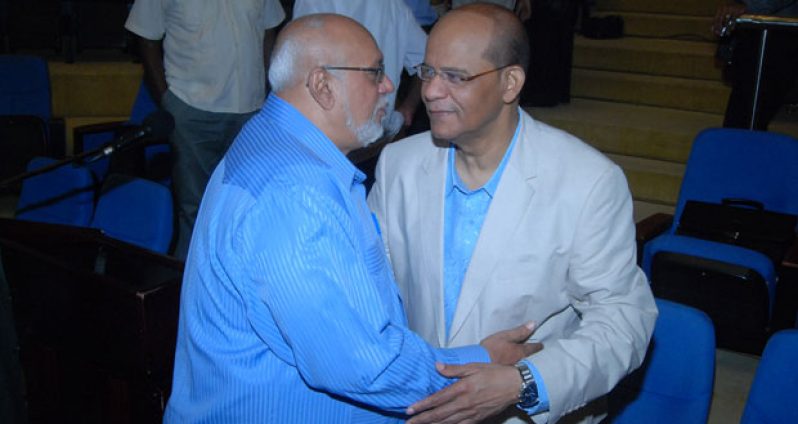A NATIONAL conference on the prevention of interpersonal violence began yesterday at the International Conference Centre, Liliendaal, Greater Georgetown.

The two-day event is being attended by such stakeholders as the Guyana Police Force (GPF), the Inter-American Development Bank (IDB) as well as several different non-governmental organisations (NGOs) and concerned citizens from all over the country.
The forum was officially opened by President Donald Ramotar, who voiced his appreciation of the Ministry of Home Affairs for organising it and expressed his hope that it would lead to programmes that will reduce the high incidence of interpersonal violence in the country.
He alluded to the remarks made by IDB Representative, Ms. Sophie Makonnen who told the audience that interpersonal violence has an economic cost, because the money spent on preventing, investigating and prosecuting the perpetrators as well as treating the victims, could have been used for more worthy causes.
However, the President emphasised that interpersonal violence not only has an economic cost as, it affects the quality of life of citizens who need to be free from fear, which is not the case at the moment.
He declared that interpersonal violence represents a threat to social order and, even though the State is entrusted with keeping law and order, civil society and ordinary citizens, too, have a duty to uphold and contribute to public safety.
“We should all, together, reject all forms of violence and support the victims of violence,” Mr.Ramotar urged.
Revisit decisions

He observed that there may be a need to revisit decisions that the country has made on many issues, such as corporal punishment, in relation to interpersonal violence.
“If we do, we might reach different conclusions,” the President remarked.
Another issue raised by him is video games, where the level of violence and cruelty he described as “unspeakable.”
He also feels the judicial system is in need of a review and may impact the level of interpersonal violence, especially the time it takes for cases to make it through the court system, which results in young, first time offenders often being locked up in holding cells with hardened criminals.
President Ramotar acknowledged that the Government needs to look at ways of expediting the process and said the contributions of stakeholders, as well as all participants at the conference, are decisive.
He said the high incidence of interpersonal violence is not unique to Guyana, because it is something with which the whole Region is grappling and regional leaders are equally alarmed.
He reiterated that interpersonal violence is a painful reality for the Region, especially considering what our ancestors went through in their quest to secure a better life for us all.
“It dishonours their legacy,” he said.
Returning to the economy, the President said that the “violence projects a negative view for those who look at us from beyond our borders. It keeps tourists and investors away and also, negatively, impacts our potential income. But for the citizens of this country, it exacts a toll beyond, finances.
“The greatest cost is the loss of life as well as the emotional suffering that the victims and survivors have to endure. However, there is also the devastating financial cost, especially if the person killed or incapacitated was a breadwinner.”
President Ramotar challenged the nation not to repeat the mistakes of the past but to learn from the successes beyond our borders, which we can adopt for our situation, as there is no “one-size-fits-all solution.”
He concluded by calling upon the attendees to bring their own perspectives and to be open to the views of others.
The IDB has been a proactive partner, supporting the Ministry of Home Affairs in its initiatives, especially in attempting to reduce violence.
Made progress
Consequently, in her speech, Makonnen recognised this relationship and mentioned that she studied the speech made by her predecessor at a similar conference, four years ago and felt that Guyana has made progress since then.
She told yesterday’s audience that interpersonal violence has a high economic cost, as money that could have been used for other projects are diverted to deal with it.
According to her, the cost can be as high as 2.9 percent of the Gross Domestic Product (GDP), which is a very high number.
“If violence is reduced, the country can use this money to improve conditions for the citizens of this country,” she suggested.
Home Affairs Minister Clement Rohee recalled attending an IDB meeting a few years ago in the United States (U.S.) and said it changed the way he saw interpersonal violence.
Before his attendance then, he saw interpersonal violence as something that was up to the security sector to solve. But, attending this meeting, he found representatives from many social sectors, including education and realised that the solution to solving interpersonal violence lies in all these social partners working together.
The minister specifically mentioned the murder/suicide which happened over the weekend and was reported on by all the newspapers. He said that the police could not have prevented that incident.
However, if citizens who knew about the troubles the couple were experiencing and had gotten involved, the tragedy could have been prevented.
The minister remembered that he made a commitment, last year, to employ an extra 500 policemen in an effort to reduce interpersonal violence.
Since then, though, he has realised that those 500 policemen cannot be in every neighbourhood, in every home. Hence, he challenged the citizens of this country, in the civil society or the different government institutions to get together on this issue; because that is the only way the problem of interpersonal violence can be successfully addressed.
After the President had spoken, the audience was treated to a dramatic performance by inmates of the Georgetown Prison.
The play depicted a typical domestic violence situation where a woman is assaulted by her partner. Unlike real life situations which, often, do not have good endings, the play ended on a note when the violent partner submits to counseling and sees the error of his ways.
(by Jimmy Roos )



.jpg)









